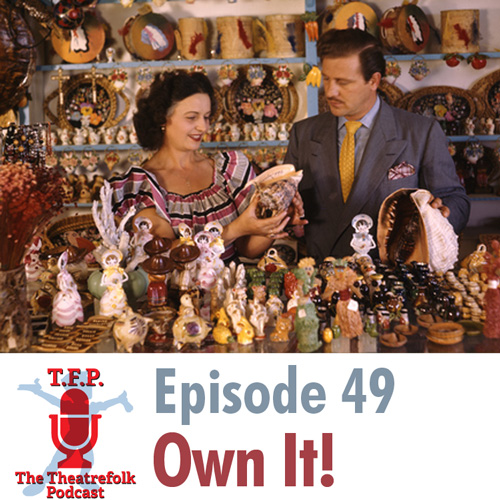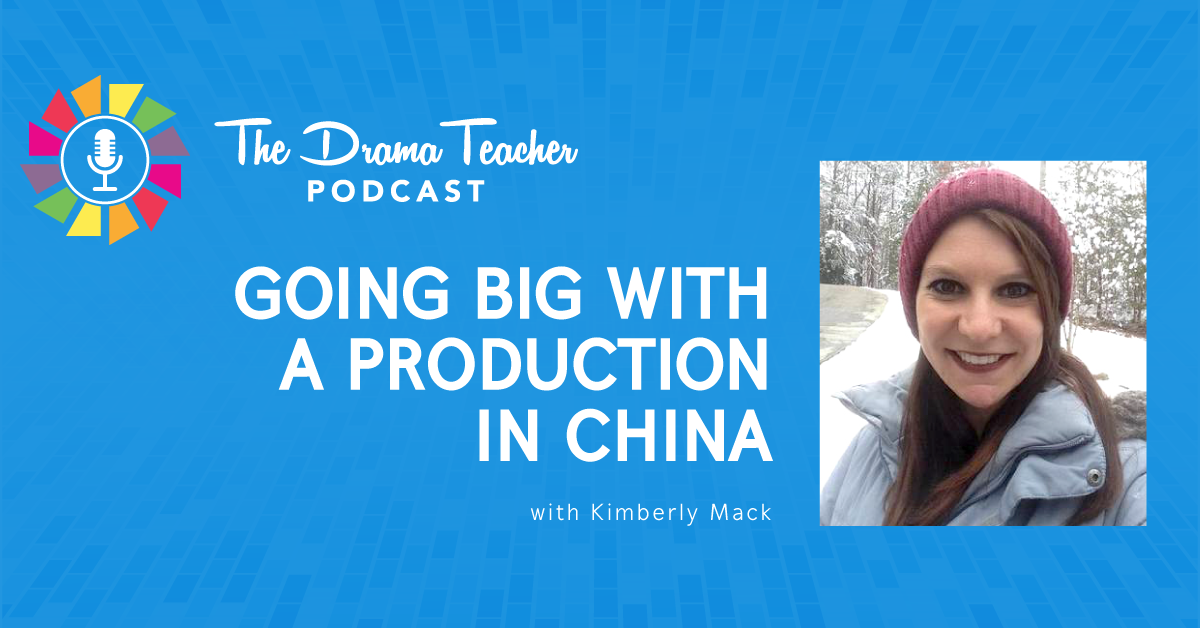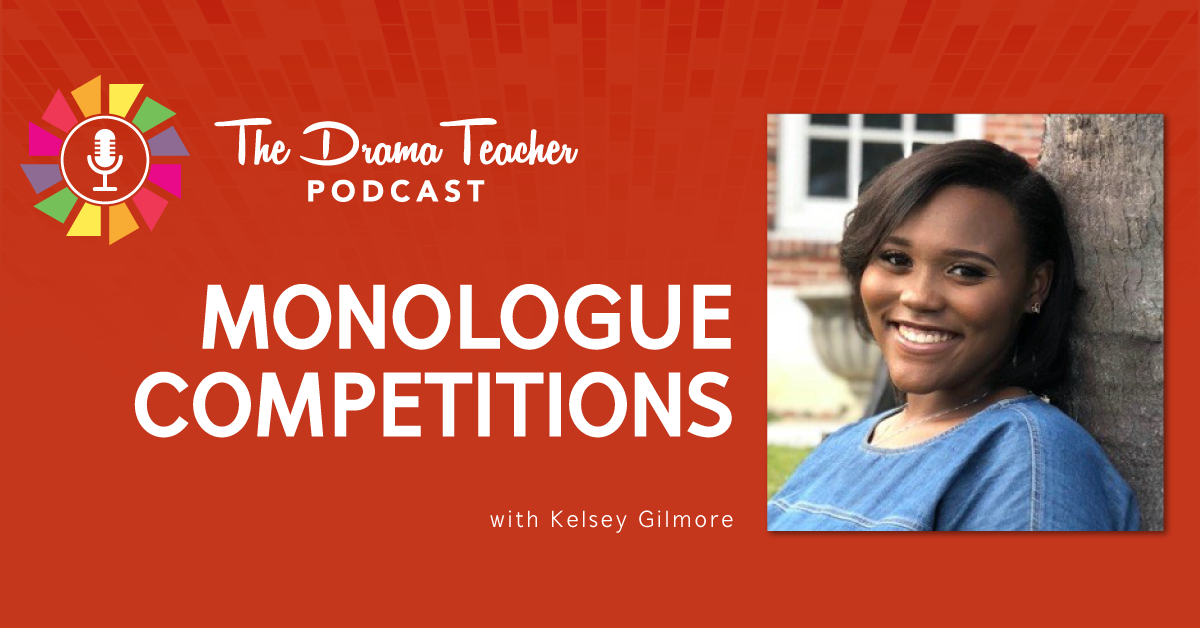Own It! You’re an artist!
Episode 49: Own It!
Sometimes the first step to being an artist is saying you’re an artist. Saying it out loud. Telling people. Putting it on business cards. Spray painting it on walls. OK maybe not that last one.
Subscribe to The Theatrefolk Podcast
Episode Transcript
Welcome to TFP, The Theatrefolk Podcast. I am Lindsay Price, resident playwright for Theatrefolk, coming at you from in front of a little foam box. Hello! I hope you’re well. Thanks for listening.
Today, you must own it. But first, let’s do some THEATREFOLK NEWS.
Well, it’s summer time and the living is indeed, as they say, easy. That is one pretty wonderful thing about having a job that follows the school market. You always know when the work is going to slow down. So, July is a kick back, relax kind of month for us expect that we’re mental and we never exactly relax and we’re sort of working.
I’m in the corner with my laptop. Craig has a laptop going and and the desktop. He’s making website improvements that I totally do not understand. He’ll tell me and I’ll nod and smile ‘cause I know what he’s doing is a good thing. I just don’t know why it’s a good thing or what exactly is the composite of the good thing. It’s like another language, right? But we’re working.
July is all about taking breaks. You know, go outside, see the world. See it’s really hot outside in the world. Come back inside. Enjoy the air conditioning. I think it’s really important to take breaks. If your life is all go, go, go, go, go, there’s no space to recharge. There’s no space in your brain to regenerate, right? And there’s nothing more frustrating than an exhausted brain and there’s nothing more fulfilling than those new ideas that come from a really fresh brain. Oh, I’ve got to love that! “Fresh brains! Fresh brains!”
Okay, so where would the news be in this intro? Well, what’s the news? The news is we’re working but we’re taking breaks. We’ve got new plays in the pipeline. I’m in the process of working on some new e-books that will be coming out this year – a new write-your-own, a monologue writing book, and a couple of others. And, well, we’ve got plans. We love this dumb little company and we love our wonderfully smart customers. Don’t you love how it works out? We’re little and dumb and our customers are wonderful and very, very smart. And we know that, well, we can do more and offer more and get out there more and I’ll sum it up by saying more is coming. That’s the news. There’s going to be more. Not exactly CNN but, you know, what is?
And lastly, where, oh, where can you find this podcast? Well, well, we do indeed post new episodes every Wednesday at theatrefolk.com – how did I pronounce that? theatrefolk.com, please and thank you. Know how to pronounce the name of your own company. And on our Facebook page and Twitter. You can find us on the Stitcher app and you can subscribe to TFP on iTunes. All you have to do is search on the word “Theatrefolk.”
Episode Forty-Nine: Own It.
So, hello! Hi. How you doing? I’m good! Are you well? Everything’s grand. It has been a while since I have been sitting here, talking to you, staring at the mic, all on my lonesome. I have to say, I’ve enjoyed the brain break from coming up with these but I also really enjoyed all the conversations that Craig and I recorded on all the shows that we saw on our trip and I hope that you enjoyed them, too. You know, the five of you who are out there listening, hello. I think I probably know all your names.
It was a pretty unique experience and it is my, well, I can’t say it’s my dream because dreams are intangible. I want to make it my vision, my motivation, my goal with steps that I recreate that experience, repeat that experience, not recreate – I don’t want the same one but I want to go back! I want to go back to England. There, I’ve said it.
“So, what are we talking about today” she says as she flexes her metaphorical podcasting fingers and reaches into the deep recesses of summer brain. Good thing I titled this podcast so I have something to refer to, right? A-ha! Oh, it’s almost like it was on purpose.
We’re going to talk about – surprise – owning it. Not a house. Not a car. Your artistic life, I guess. And it’s a question that comes up all the time, right? How do I….be a playwright? Be a dancer? Be an actor? Be a musician? Be somebody in the arts?
The problem with asking this question is that, as with all questions, we really expect that two plus two will equal four and that just isn’t the case. There is no one set of rules for everyone – every artist, every person who pursues the arts. It’s not like a job that has a solidified set of steps.
“I want to be a teacher.” “Okay, well, go to school, get a degree, go to teachers’ college.” You know, that’s how it is Ontario and other places I assume. Decide what level I want to teach. I apply for a job at that level. I, hopefully, if the medium is right, get a job and I teach. And successes, failures, highs, lows aside, that’s what it takes. There are steps in place to go from point A, I want, to point B, I am.
It just doesn’t quite work that way in the various factions of the arts. You could go to school, you could get a BA in the arts, but you could just as well not. A degree is not a prerequisite nor does it determine success. The degree that I have, English degree, really – aside from research and background – has nothing to do with my job.
Aside from some very, very special circumstances, you can’t apply for a job in the arts and get to keep it for an extended period of time like ten, twenty years. So, I suppose that’s why the question is so often asked because there are so many jobs that follow a pattern – point A to point B – and it makes sense to someone just starting out in the arts that maybe that works like that too even though it doesn’t.
What you’re doing is taking one framework and trying to apply it to another and the two just don’t fit! You can’t think of a career in the arts as like anything else out there. Like anything else which is one of the reasons why we do it, of course. We don’t want one of those other jobs. I never wanted one of those jobs and I had lots and lots of practice at those other jobs. I was a temp, a temporary employee, for nine years at the start of trying to figure out my artistic career and that nine years was plenty of hours and minutes and seconds to figure out that point A to point B, sitting at a desk from nine to five was never going to be something that I ever sought out. It really does give me chills thinking about it – the thought of waking up, leaving the house with a modicum of effort to look like I didn’t just wake up, fighting through the throngs and the throngs of sour-faced people all moving like herds of cattle as if to their death – moving towards looming buildings, crammed into elevators, spilling out onto floors with recycled air and soul-killing lighting to sit in a small box, or worse, a small cubicle with grey carpets and grey walls. and to have to be at my desk, staring at those grey walls at a specific time for a specific length, a specific period, with maybe a 15-minute break in the morning, some sort of break for lunch – maybe a half an hour, maybe an hour – maybe if you were lucky, a break in the afternoon, and to sit there until a specifically designated time when you could lunge from your desk, lunge into the elevator, fight for air, for space among now the sour-faced throngs now moving like herds of cattle in the opposite direction, home again, and that doesn’t even start to factor in the mind-numbing actual job actions, the conversations, the pettiness, the recreation of high school at a much, much more grosser level. That’s just going to and fro, you know?
It just wasn’t my cup of tea, man, if you hadn’t guessed. And time and time again, when I was at these jobs, I would be asked “Don’t you want to work full-time?” “Like this? No, thanks!” And when I would be offered a job at some of these companies – as I was, time and time again – and then, when I would turn down said jobs, you know, the people would look at me with such puzzlement like, “Don’t you want a job?” Because what they had was the traditional, right? They had the parameters of what a job should be. They went from point A to point B to get said job and they didn’t see what I had as a job. But I had one which is different. Thank God it was different!
So, that’s the first thing. You know, it’s important to realize that a life in the arts is different. There is not a laid-out framework to step into which, I know, is not a helpful thing to say because sometimes artists, they’re just not even looking for a framework. They’re just trying to figure out one thing to do. What’s the first movement that a foot takes? The first step! And what would that first step be, Lindsay, since you have so much to say on the topic? Well, yes, I do have an opinion. So, share it! Okay then! I will! We’ll do it then – which I think is from Pee Wee Herman, but don’t quote me.
Sometimes, the first step to being an artist is simply saying, “I am an artist.” Whaaaaaaat? I know, I write these out. I actually wrote out, “Whaaaaaaat?” What are you talking about? What does that mean? No wonder people don’t take artists seriously. You’re not even suggesting school or a work program or back packing through Europe. You are right; I am not! You should explain yourself. Okay, I will. We’ll do it then. Recall! Okay, technically not, and it was too soon. I knew it was too soon anyway. I’m not perfect. This is not perfect. Shall I go on? Okay.
So, sometimes the first step to being an artist is not asking the question, “How do I become an artist?” but by taking a stand and declaring what you do. Say it out loud in a statement, not a meandering “muh,” but telling people, putting it on business cards, spray painting it on walls – okay, maybe not that last one – but we have to assume that if you are asking the question, “How do I be an artist?” you’re already doing some kind of art, right?
You have a passion for playwriting, or dance, or acting. It is in you. So, be that. So, you’re already doing it, so you are. Publicly own it. Own being a playwright, a novelist, a song writer, a musician, a dancer, an actor, and when people ask what you do, you tell them with pride, “This is what I do. This is what I am. Not what I want to be, not what I’m thinking about, not what I’m dreaming about, not what I would love to be. This is what I am!” which is not as easy as it sounds. It’s not an easy statement to say out loud.” I am a doctor.” That’s easy, I got from point A to point B. I’m a teacher. You know? I’m an accountant.
It’s hard to say out loud, “I’m a playwright,” with pride. It took me years. Like, years. Now, I say it all the time. I’m really awesome at, like, shouting it from rooftops. “ I am a playwright!” And when I have to create an online username for myself, I am always lindsaywriter. I love it. I am a writer. But I didn’t always.
There was a long time that I was pretty embarrassed, humiliated, to tell people I was a playwright because the next question after I said, “What do you do?” “Oh, I’m a playwright,” the next question always was, “Have you done something that I’ve seen? Have you done something that I would know?” And my answer was pretty much always in the negative. “Nope.” Because that’s the tricky thing about being an artist, isn’t it? Sometimes, when we write, we act, we dance, we are doing the thing that we love. We our doing our job, but technically, we’re not. Technically, we’re not working. Traditionally, we’re not working because we’re not being paid for what we do. We don’t go to an office. We don’t work nine to five. We don’t work Monday to Friday. We are not doing our work at a level that Joe Public considers acceptable so it’s not work. It’s not a job which circles us back round again.
We’re back to frameworks because the subtext to the question, “How do I become an artist?” is kind of, “How do I get paid for this thing I love to do so much because that’s what my parents want to know. How am I going to make a living? How am I going to pay bills? How am I going to pay my rent? How am I going to sustain myself so that I don’t end up living in a box under the freeway because that’s what they’re afraid of and they don’t understand what I do and they don’t get that what I do – what my job is – doesn’t have the same laid out set of steps as regular jobs do. How do I explain it to them?”
Well, there are a couple of tricks to dealing with this. Some of it involves making up your own rules within the rules that everyone around you expects you to live by.
Number one: own it! You have to own what you are doing and it’s really important not to be wishy-washy. “I want to… I would like to… Gee, it would be swell to… I’d love to… I dream about… Oh, it would be so great…” No. “I am an actor. I am a dancer. I am a song writer.” You must be definitive. You must be strong. You must look people in the eye. This is not the time to be an introvert, pasty-faced, silent writer type. Confidence is what civilians are looking for – that you know what you’re doing, that you know what you’re talking about. And for heaven’s sakes, fake it if you don’t!
You want people to take you seriously? You want people to take your work seriously? You want people to believe that you know what you’re doing and that your job is real? Pretend that you know what you’re doing! Pretend it is real. No one will know the difference. You know, real to them is a much different thing than real to you, and if you can make them believe that what you’re saying is their rea—oh, my gosh! I just went down a whole different road. But it really is about stating and being confident and not letting their rules define you. “I am a playwright.” Boom! Lay it down like a running back spiking that ball in the end zone. There it is. Deal with it. That’s what I am!
Second, you better have an answer for the question that will always follow that statement that you are making. “I am a playwright.” What’s next? Well, “What are you doing? What have you done? Have you done anything that I’ve seen?” Meaning “Are you a big shot? Are you Hollywood millionaire success story?” and, if the answer is no since for most of us that’s what it would be, you need a rock solid, no way anyone could shake, “I am a mountain. You couldn’t break me if you tried,” answer.
It’s a question we all hate. That’s a given. It’s a question that comes up all the time. That’s a given, too. But it’s important to remember that, more often than not, it is a question that is asked out of ignorance and not out of malice. They’re not trying to tear you down. That stranger trying to engage you in conversation wants to connect to your world and they want to connect it to the one that they know. And so, if they’re asking you the question and you’re an actor, say the world they know is actors act in commercials and on TV and in movies. So, it does make sense that they would try to connect you to being in movies even if you’ve never done one. And when your Aunt Sally says, “Why aren’t you in that movie? Do you know Leonardo DeCaprio? You should do commercials. They make money.” She just doesn’t understand the process. She’s just trying to make a connection.
When people would ask me if I’d written anything they’ve seen, they weren’t trying to humiliate me or embarrass me even though that was my instinctual reaction. You know, I thought it was all about me. In reality, it was just all about them. They have no idea how the process works. They didn’t know what I did. And why would they? I don’t know, just as I have no idea about the job that Craig is doing working on the computer. You know, why would, you know, Joe Public have any idea what it takes to write a play? I’d like them to know but so what?
And if you’re at the start of your career, you’ve got parents who are freaking out that you want some kind of artistic life, maybe it’s not because they want to stifle you and clamp down on your creativity. Maybe sometimes it’s because they, you know, love you and they don’t want you to live on a box underneath the freeway. I think that it is a pretty reasonable expectation that a parent would want for their child.
Now, so when I get that question, I have a solid, “You can’t shake me” answer. “Have you done anything I’ve seen?” “No, you haven’t. You haven’t seen anything.” You know, all the work I do is in schools. I write for schools and student performers. That’s what I do.
And the funny thing is, when I started stating that with confidence, when I started owning who I am and what I do, not one person looked down at me or my job. Well, maybe they do behind my back but what do I care about that anyhow? But when I look them in the eye and I state it and I own it, they usually say, “Wow! That’s cool!” It just isn’t what they traditionally connect to. It isn’t movies. But they get that I mean it.
So, you better have an answer in your back pocket. Don’t fumble. Don’t mumble. Don’t kick a stone or jam your hands in your pockets or turn red. “I am an actor and I’m taking classes so that I can improve and get better at it.” “I’m a song writer. I’m writing eight hours a day right now and I’m researching recording studios.” So what? So what if you’re working at a 7-Eleven or you’re working a waitressing job on top of that? Don’t demean what it is that you do. Find an answer to that question that is really at the heart of what you’re doing. And so what if it doesn’t follow the right rules, you know? Or the parameters of jobs, of nine to five and here’s my salary and here’s the check that I get at the end of every two weeks, you know? Make your own rules.
Actually, another really good tip is that, if you really have to explain to somebody, maybe you have family members you have to explain what you do on a regular basis, find out language that they key into, you know, a job that fits in a framework that people understand. You know, research is a good word for that, and then craft a way to describe what you do using those words.
You know, people get weirded out by things they don’t understand, by people who use language that they don’t understand. And if you can find a common ground, find a language base to put them at ease, all the while owning what you do and speaking with confidence, you can – oh, I’m not going to say trick people but you can comfort those around you. That, you know what, living in a box under the freeway isn’t your intention either and you do take it seriously and you are not a stereotype. You are working a job.
And It goes without saying, too, that while you are saying, “I’m a playwright. I am a musician. I am a painter,” you better be doing that. You better be doing your art all day, every day. It doesn’t count if you say it and then you don’t do anything. You better be doing it all the time. So, that’s step number two.
One, own it. Two, do it. Look at that. See? Two steps. Now you’ve got two steps. You have two steps! You’re on your way!
And that’s where we’re going to end. Take care, my friends. Take care. Over and out from the little foam box.
Music credit: “Ave” by Alex (feat. Morusque) is licensed under a Creative Commons license.



